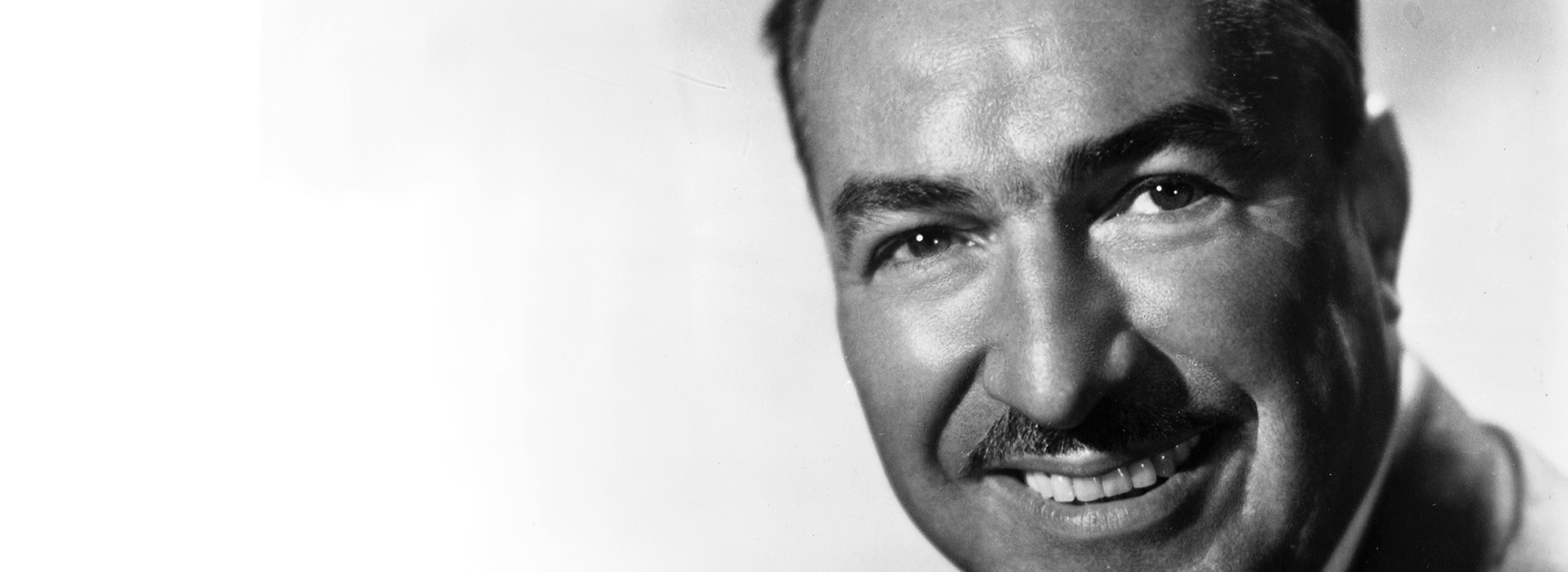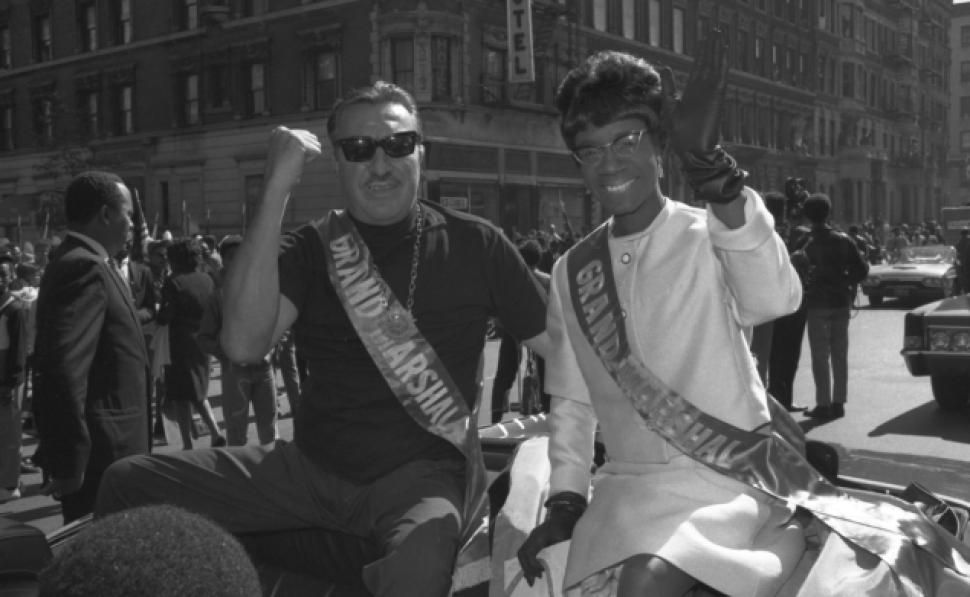“Once in a lifetime, a man like that comes along … once in a lifetime.”
Audrey “Queen Mother” Moore, Black nationalist and activist
On November 29, 1908, in New Haven, Connecticut, Adam Clayton Powell, Sr. and Mattie Shaffer Powell welcomed a healthy baby boy, Adam Clayton Powell, Jr. into the world. The younger brother of their 10-year-old daughter, Blanche, he would be their last child and only son. A pastor, Powell, Sr. was called that year to serve at Abyssinia Baptist Church in Harlem, which, upon being one of the most prominent settlement sites for African-Americans involved in The Great Migration, had become a mecca of Black culture.
Harlem, a community in the Manhattan borough of New York City, had been a home to “The New Negro”, a term created by Dr. Alain Locke, a co-creator of The Harlem Renaissance. Locke, in 1907, was the first (and last until 1960) African-American Rhodes Scholar and would chair the philosophy department at the historical Black college, Howard University. He used this term as the title of his book, The New Negro, and to identify those African-Americans who would seek, through Black identity as expressed via the arts, politics and social involvement, to gain racial equality.
The recent implosion of Southern and Western Black migrants, many of who were Christians, upon the urban community of Harlem was massive. Thousands of new Harlemites found their spiritual home at Abyssinia Baptist Church and in 1922-23, Reverend Powell, Sr. had constructed a new home for the church, located at 138 135th Street. With a congregation of more than 10, 000 members, Reverend Powell, Sr. was the leader of the largest Protestant congregation in the United States!
Adam Clayton Powell, Jr., “as the Prince of Abyssinia”, lived a privileged life, especially in Harlem. He would perform well academically but was as comfortable in nightclubs on Saturday nights as in the sanctuary on Sunday mornings. Adam actually became, to his parents, too comfortable and upon completing his first university year at City College, City University of New York, his parents sent him to Colgate University, an all-male institution of higher learning in Hamilton, New York; it was at least a half hour away from any nearby town. While there, Powell, Jr. did not disclose his race, choosing instead to avoid racial discrimination and “pass” as White and even pledging a White fraternity. However, upon a university background check, his racial identity was discovered and he resumed to live his life as Black. Upon graduation from Colgate in 1930, he returned to Harlem and assumed the post as an associate pastor, serving under his father at Abyssinia. He would earn a Master of Arts degree in religious education from Columbia University in 1931 and his Doctorate of Divinity degree from Shaw University in 1934. He also became a member of Alpha Phi Alpha, the oldest Black, Greek-lettered, intercollegiate fraternity in the United States.
Powell, Jr. experienced great shock upon his return to Harlem. During this time period, The Great Depression had struck the United States and no ethnic group was hit harder than African-Americans. According to author Christopher Klein in, “Last Hired, First Fired: How the Great Depression Affected African Americans”, African-Americans were “the first to see hours and jobs cut and they experienced the highest unemployment rate during the 1930s.” Compounding the drop of unemployment was the fact that African-Americans already earned significantly less than their ethnic counterpart, thereby having less monies to save in times of economic struggle, let alone, an economic collapse.
Historian Cheryl Lynn Greenberg wrote about Black unemployment during The Great Depression in To Ask for an Equal Chance: African Americans in the Great Depression. Greenberg stated that the unemployment rates of Blacks in the South “were double or even triple that of the White population. In Atlanta, nearly 70 percent of Black workers were jobless in 1934. In cities across the North, approximately 25 percent of White workers were unemployed in 1932”, while 50 percent of Black workers in Chicago and Pittsburgh and 60 percent in Philadelphia and Detroit were jobless!
His shock at the effects that The Great Depression had upon African-Americans, especially in Harlem, prompted Powell, Jr. into action. In 1930, according to the United States Representatives History Art and Archives biography on Adam Clayton Powell, Jr., “he organized picket lines and mass meetings to demand reforms at Harlem Hospital, which had dismissed 5 doctors because they were Black. Beginning in 1932, with a congregation of greater than 14, 000 members, he administered a church–sponsored relief program that provided food, clothing, and temporary jobs for thousands of Harlem’s homeless and unemployed. It was during The Great Depression that Powell established himself as a charismatic and commanding civil rights leader. He directed mass meetings, rent strikes, and public campaigns that forced employers including restaurants, utilities, Harlem Hospital, and the 1939 World’s Fair in New York City to hire or promote black workers.”
In 1938, Powell, Sr. retired and Powell, Jr. assumed the pastoral role. From Abyssinia, his church-sponsored relief program included an adult education center, an employment bank, a nursery and a soup kitchen. They collected clothes and shoes, mending, laundering and shining when needed, and gave them to those in need. Powell, Jr. would passionately speak on community issues, even of riots in Harlem and other Black urban centers, denouncing racial discrimination as the true culprit of inequity. In 1942, he would also start his own newspaper, The People’s Voice. Considered to be a publication for progressive African-Americans, it detailed everything from events to persons from the local to international level. Powell, Jr. would utilize The People’s Voice to also disseminate his views to those outside the Harlem community.
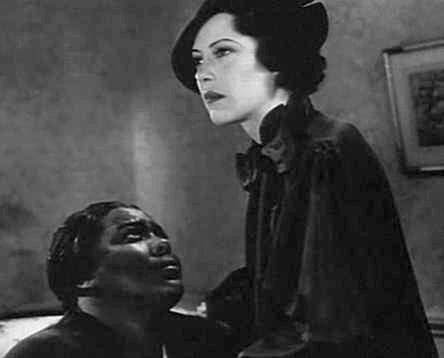
(No copyright infringement intended).
Persons who worked at the publication include Fredi Washington, who served as the Entertainment Editor of The People’s Voice. Washington was an actress who starred in Black and Tan (1929) and Emperor Jones (1933) but is perhaps best known for her role as “Peola” in the original Imitation of Life (1934), starring Louise Beavers and Claudette Colbert. Washington would leave the silver screen and devote her life to civil rights activism and even gathered primary data with Walter White during their time at the National Association for the Advancement of Colored People (NAACP), of which White was the president.
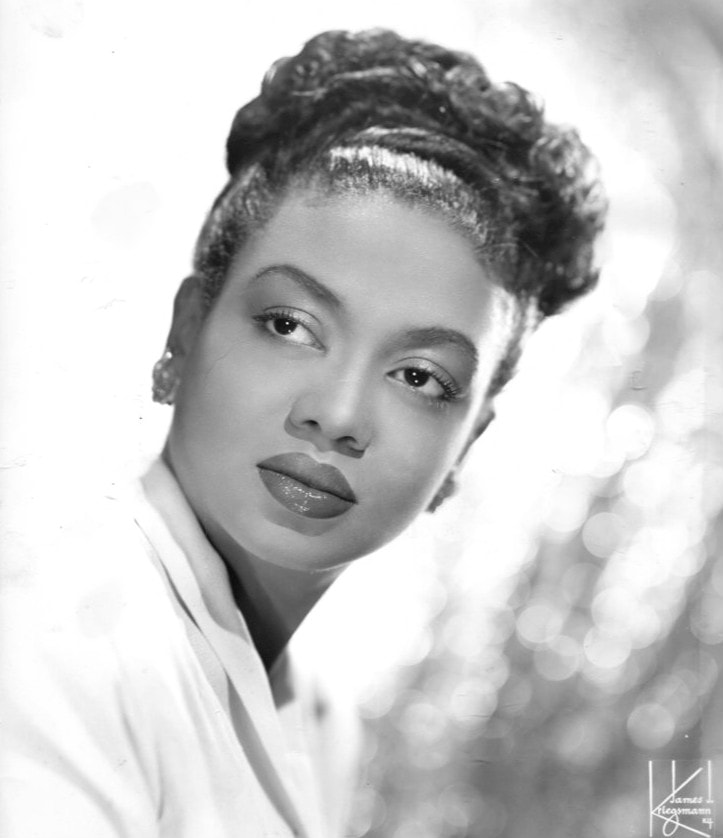
(No copyright infringement intended).
Also, during that time, in 1933, Powell would marry Isabel Washington, an actress and showgirl who was the younger sister of Fredi. If the occupations of Isabel weren’t controversial enough, she was a divorced mother of one son and a Catholic. Their marriage would end in 1945, after which when he would soon marry jazz and classical pianist Hazel Scott. Hailing from Port of Spain, Trinidad and Tobago, Scott was a musical prodigy and, in 1950, was the first Black person to have her own television show, The Hazel Scott Show. They would have only one child, Adam Clayton Powell, III. Their marriage ended in 1960 and he would marry Yvette Flores Diago of Puerto Rico. They would remain married only 5 years and also have a son, Adam Clayton Powell Diago. Adam Clayton Powell Diago dropped his mother’s surname when he entered Howard University as a student and chose to go by “Adam Clayton Powell IV”. However, Adam III and his wife, Beryl, had a son, Adam Clayton Powell IV; Adam Clayton Powell Diago has often gone by “AC Powell IV” since. Like his father, AC Powell IV was involved in New York politics; he followed in his father’s footsteps, becoming a New York City Council Member (1992-1997) and a member of the New York Assembly (2001-2010). To be certain, the election of Adam Clayton Powell, Jr. was groundbreaking.
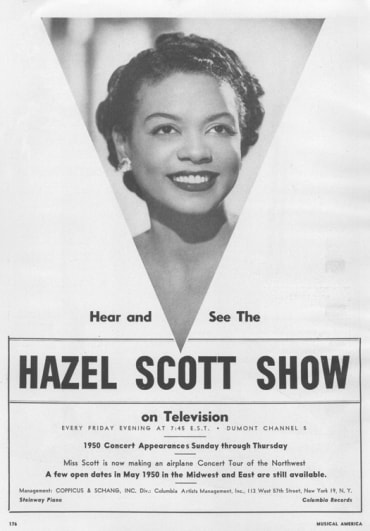
(No copyright infringement intended).
In 1941, Adam Clayton Powell, Jr. made history when he became both the leader of the first racially-motivated boycott of public transportation and the first African-American elected to the New York City Council. These accomplishments, in conjunction with The Black Church, prompted biographer Dr. Lenworth Gunther to refer to Powell, Jr. as “ … far more than an antecedent (to the Civil Rights Movement) … he was an individual who demonstrated the power of The Church as a protest instrument, the power of The Church as a social instrument, the power of The Church as a community organizing instrument and the power of The Church as a political instrument.”
These accomplishments, including the fact that his newspaper reached thousands, further bolstered his growing support outside the Harlem community and inspired him to seek higher office. When a new congressional district was created for Harlem, Adam Clayton Powell, Jr. wa a prime candidate. In 1944, Powell ran for the United States Congress on a platform of civil rights for African Americans. His platform outlawed poll taxes and lynching and promoted fair employment practices. Devices such as poll taxes, literacy tests and the grandfather clause were used, particularly in the American South, to disenfranchise many Blacks and poor Whites from inclusion in politics.
In 1944, Adam Clayton Powell, Jr. sweepingly won the seat, making him the first African-American elected to Congress in any northeastern United States. He would serve in the 79th-91st Congress, (1945-71), a total of 12 terms. The committees on which he served includes the Indian Affairs Committee, the Invalid Pensions Committee, the Labor Committee and the Committee on Interior and Insular Affairs. In 1947, the Education Committee and the Labor Committee were combined and Powell, Jr. remained on this new committee for 11 terms, serving 3 of the terms as Chairman.
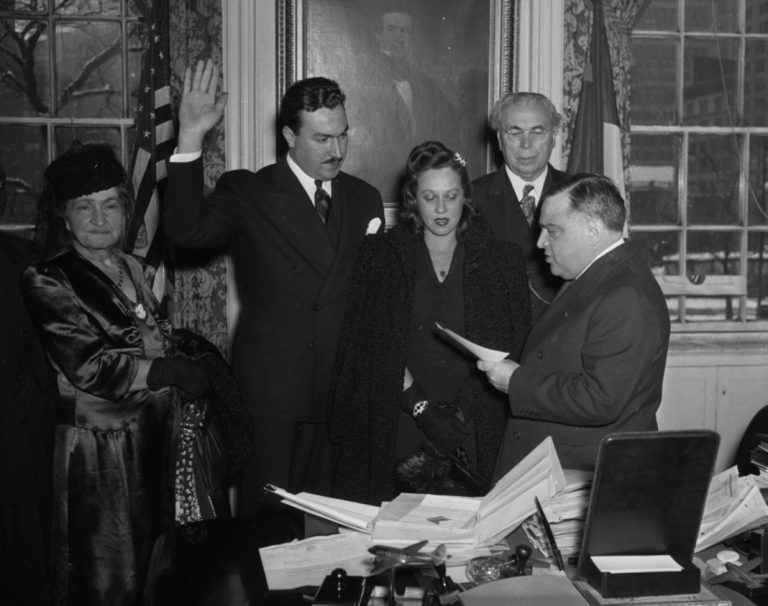
(No copyright infringement intended).
Acts for which he’s responsible involved, as written by scholar Shirley Washington in Outstanding African-Americans in Congress, “… legislation to extend the civil rights of District of Columbia residents, to outlaw lynching and the poll tax, and to end discrimination in the armed forces, housing, employment, and transportation. He attached an anti–discrimination clause to so many pieces of legislation, the rider became known as “The Powell Amendment. Initially considered a symbolic maneuver, his rider was included in the 1964 Civil Rights Act.” Powell chose to attach this amendment that prohibited federal funding to groups and institutions that advocated unequal treatment to and specifically discriminated against African-Americans, earning him the epithet, “Mr. Civil Rights”.
This threat of loss of funding infuriated Representative Cleveland Bailey (WVA), an avowed segregationist. During a July 1955 meeting, Bailey punched Powell in the jaw, afraid that Powell’s amendment would undermind Bailey’s legislative power. They later reconciled their differences.
However, there was strong logic behind The Powell Amendment. Powell, Jr. understood that in a capitalist society, those in power would only respond and enact change to that which is “respected” for its capital value and wealth. It was as if he said to those who discriminated against African-Americans, “If you are willing to bite your nose to spite your face, we are too.” Considering the historical treatment of Blacks by America and the United States, it was obvious to Powell, Jr., especially as a Baptist minister, that appealing to moral principles of society had been highly ineffective.
The admission of Adam Clayton Powell, Jr. into Congress was met with great opposition. Racial discrimination, including of public facilities in Congress, such as the barbershop, restrooms and dining halls, dominated society, even in Washington D.C. Congressman John Rankin (MS), who denounced Powell, Jr. solely on racism, vowed to never sit next to Powell, Jr. In turn, Powell, Jr. took every opportunity to sit next to Rankin. In the documentary, “Adam Clayton Powell”, narrator Julian Bond stated that in one session, reporters recorded 5 times Rankin moved seats in order not to sit next to Powell, Jr., who constantly followed Rankin’s every seat change. Dr. Charles V. Hamilton wrote of the sentiment of Powell Jr. in the Adam Clayton Powell biography, “I am happy that Rankin will not sit by me because that makes it mutual. The only people with whom he is qualified to sit are Hitler and Mussolini.” Powell also denounced the racial slurs Rankin and other southern Democrats used in session, demanding the House Parliamentarian to investigate and sanction the use of these slurs on the floor.
Despite warnings from the U.S. State Department, Adam Clayton Powell, Jr. was the only Congressional representative to participate in the 1955 Asian-African Conference in Bandung, Indonesia. Traveling at his own expense, he spoke on the strained race relations of the United States and the country’s efforts for progress in integration while defending it against China’s attempts to denounce the States for its hypocrisy in racial discrimination. He later used his position on the congressional floor to promote true democratic ideals of freedom as well as congratulate countries such as Ghana, Indonesia and Sierra Leone, for removing the yolk of European colonial imperialism and oppression. Many African-Americans in various stations in life considered him a great leader and persons including Malcolm X (later known as El-Hajj Malik El-Shabazz), Shirley Chisholm and Ella Fitzgerald were his friends and supporters.
(No copyright infringement intended).
In Congressmen in Committees, Richard F. Fenno, Jr. supported Washington’s account of accomplishments of Powell, Jr. with, “… When Representative Barden retired after the 86th Congress (1959–1961), Powell Jr., next in seniority, assumed the chairmanship of the Committee on Education and Labor, a position he held for three terms until January 1967. With access, directly and indirectly, to 10 billion dollars, Adam Clayton Powell, Jr. became 1 of the most powerful men, Black, White or otherwise, in the United States!”
His influence was highlighted in the article, “Adam Clayton Powell” of “Black Americans in Congress” of the Wayback Machine, “ … in 1961, after 15 years in Congress, Powell advanced to chairman of the powerful United States House Committee on Education and Labor. In this position, he presided over federal social programs for minimum wage and Medicaid (established later under Johnson); he expanded the minimum wage to include retail workers; and worked for equal pay for women; he supported education and training for the deaf, nursing education, and vocational training; he led legislation for standards for wages and work hours; as well as for aid for elementary and secondary education, and school libraries.”
He made possible for the first Black cadet to enter the U.S. Naval Academy, for Black reporters to be integrated into the press galleries of Congress and, according to the film documentary, Adam Clayton Powell, “continued to push for desegregation in the military, public schools and the workforce.”
Serving as chairman of the Committee of Education and Labor was the most productive period of his congressional career. Under his leadership, the Committee drafted 60 major pieces of legislation that were overwhelmingly passed by Congress. These measures, according to the United States Representatives History Art and Archives, authorized “… federal programs for increases in the minimum wage, education and training for the deaf, school lunches, vocational training, student loans, and standards for wages and work hours as well as aid for elementary and secondary schools and public libraries.” Representative William Ayers declared that there would be no “War on Poverty” without Adam Clayton Powell, Jr. Fenno, Jr. echoes this sentiment when he detailed that a Committee member, in 1965, emphatically declared, “We have been a more productive committee in the last year and a half than ‘The New Deal’ … you talk about Roosevelt’s ‘One Hundred Days’ – what the hell; look at what we’ve done. It’s been under Powell’s chairmanship and you’ve got to give him credit for that.”
In spite of these incredible accomplishments, the career of Adam Clayton Powell, Jr. included legal and political battles with Tammany Hall, the political machine of the Democratic Party that dominated New York politics; the charges of mismanagement of committee funds; chronic absenteeism from Congressional duties and refusal to pay costs from a slander judgment against him. Because a person could not be served legal summons on a Sunday, often Powell, Jr. flew in to Harlem from his home in Bimini of the Bahamas in order to perform his pastoral duties of Abyssinia Baptist Church.
In January 1967, the House Democratic Caucus removed Powell, Jr. of his committee chairmanship and the entire House demanded the Judiciary Committee investigate him for the mismanagement of funds and absenteeism; in March, the House voted, 307-116, to exclude him from his duly-elected seat. It is during this period, that Powell urged his supporters to “Keep the faith, baby,” which would become his popular saying.
A Special Election to fill the vacancy caused by the exclusion of Adam Clayton Powell, Jr. was carried out; however, the votes for Powell, Jr. flooded in, causing him to be victorious. Powell, Jr. did not take his seat though, as he was filing a separate suit, Powell vs. McCormack, to retain his seat. In November 1968, Powell was re-elected. On January 3, 1969, he was seated as a member of the 91st Congress but was denied seniority and fined $25,000 (USD). In June 1969, the Supreme Court of the United States ruled in Powell vs. McCormack that the House had acted unconstitutionally when it excluded Powell, as he had been duly elected by his constituents
Due to declining health (he had been diagnosed with cancer), political controversies and his chronic absences, in 1970, Adam Clayton Powell, Jr. would lose his congressional seat …but by less than 150 votes. This loss was the first time in 36 years that Powell would not serve in Congress, as New York State Assemblyman Charles B. Rangel, also of Harlem, had earned the victory. It would be the last term that Powell, Jr. would be active in politics. In 1971, Powell, Jr. would resign from his position as pastor at Abyssinia Baptist Church and permanently retire to live in Bimini. In early April, 1972, he would suffer from prostatitis and be flown to Miami, Florida. On April 4 1972, Powell passed away; his service was held at Abyssinia Baptist Church and his son, Adam Clayton Powell, III spread his ashes over the sea surrounding Bimini.
The legacy of Adam Clayton Powell, Jr. continues far beyond the schools in Harlem and Chicago, the boulevard north of Central Park and the state office building so named in his honor. It extends beyond the highly-lauded film, Keep the Faith, Baby, starring Harry J. Lennix, III., Vanessa L. Williams, Russell Hornsby and Lance Reddick. It encompasses much greater than the 2019 acclaimed Epix series, Godfather of Harlem, which stars Forest Whitaker as Harlem organized crime leader, Ellsworth “Bumpy” Johnson, Nigel Thatch as Malcolm X and Giancarlo Esposito as Powell, Jr.
Adam Clayton Powell, Jr. was a powerful, proud, audacious & brilliant Black man who fought politically and socially to drastically improve the lives of many, especially African-Americans. This did not come without costs, whether personally, professionally or societally imposed; and these costs, as co-Pulitzer Prize winning journalist Roger Wilkins stated, “… tell us something quite profound about being Black in America … he was born as high in the Black Community as a man could be born and he was carried even higher by his own gifts and by the love that the Black Community had for him. And yet no Black person, at least up through the 20th century, gets through life in these United States without paying a fearful, psychic Black tax … and Adam served his people, lived as a human being and paid a horrific price.”
Despite aspects of controversy, Congressman Reverend Dr. Adam Clayton Powell, Jr. was the prominent pastor of one of the most powerful churches, Abyssinia Baptist Church, in the United States and a pioneer in attaining justice and greater equity for those suffering racial discrimination. Powell, Jr. would build upon his accomplishment of being the first African-American to represent the state of New York in Congress and parlay it to serve 12 consecutive terms (79th Congress-91st Congress, 1945-1971). He was intelligent, charismatic, egotistical, brave, confrontational and giving and by 1965, Adam Clayton Powell, Jr. was the most powerful Black man in political history!
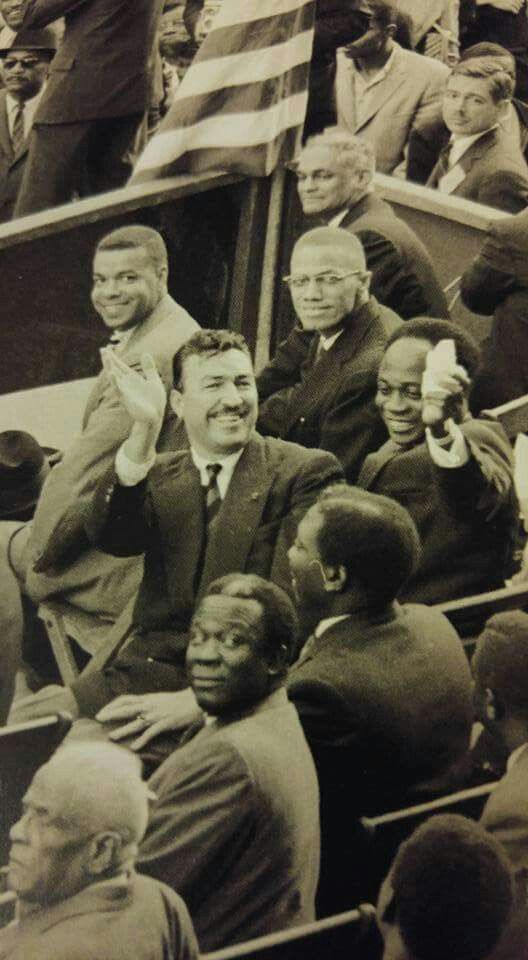
(No copyright infringement intended).
He would respond that he would “give no more and give no less” when questioned about the sincerity of his intent and actions, specifically in comparison with White congressmen. However, blending the secular and non-secular, Powell, Jr. inspired many African-Americans and is most associated, according to author Thomas A. Johnson in A Man of Many Roles, with his popular slogan, “Keep the faith, baby; spread it gently and walk together, children”.
The words of Dr. John Henrik Clarke best describe, for many, the impression of Congressman Reverend Dr. Adam Clayton Powell, Jr., when he elegantly stated about Powell, Jr. not long after his death, “… in order to understand Adam, you need a child and a very old man. You need a child to say that the late emperor of Harlem politics had no clothes. And you need an old man to say that there was a time when he had clothes … and they were beautiful.”
“Press forward at all times, climbing forward toward that higher ground of the harmonious society that shapes the laws of man to the laws of God.”
Congressman Rev. Dr. Adam Clayton Powell, Jr.
